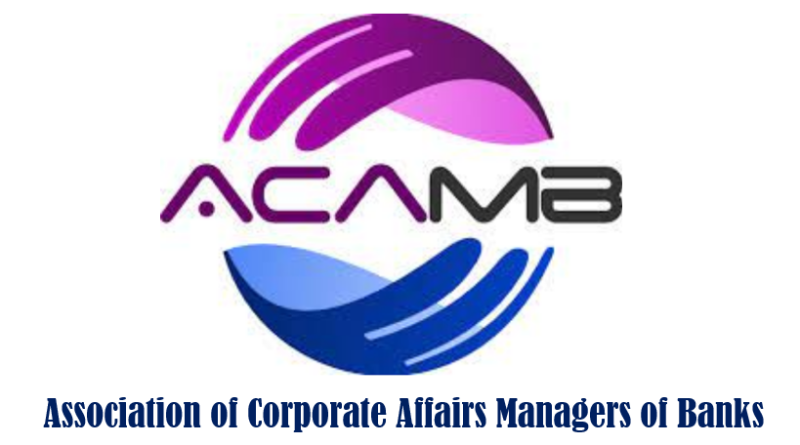Banks are not hoarding new Naira notes, normalcy returning soon – ACAMB
The ACAMB shares the public’s sympathy for the unanticipated difficulties arising from the ongoing implementation of the upgraded cashless policy and redesigned naira notes. There is no question that the national policy to promote cashless transactions, together with the unanticipated restrictions on the withdrawal of old naira notes and introduction of new naira notes, have had UNINTENDED consequences on the majority of the Nigerian population.
Over the past few years, Nigerian banks have reportedly spent over N100 billion setting up and maintaining cutting-edge electronic channels as part of a continuous commitment to flawless customer experiences and real-time digital financial operations. Not less than 80% of Nigerians now benefit from some type of digital or cashless transaction, made possible by investments made by Nigerian banks, including internet banking, mobile apps, Automated Teller Machines (ATMs), Point of Sales (PoS) merchants, mobile wallets, Unstructured Supplementary Service Data (USSD) codes, agents, and digital franchises, among others.
Nigeria has progressively evolved and is now acknowledged as having one of the top 10 real-time payment markets in the world and possibly Africa’s most sophisticated digital financial services business because to the pledges made by Deposit Money Banks (DMBs). Nigeria’s reputation as having Africa’s most digitalized banking sector is a source of national pride and evidence of the banks’ dedication to providing excellent customer service. Nigerian banks are still dedicated to making more investments in secure, frictionless digital banking that entices users to actively use and rely on the numerous digital and alternative PAYMENT SYSTEMS accessible.
The improved cashless policy promoted by the Central Bank of Nigeria has the full support of ACAMB due to its many advantages and the state-of-the-art capabilities of the Nigerian banking industry (CBN). The whole banking industry is collaborating with the apex Bank and other stakeholders to urgently address implementation challenges and guarantee that Nigerians experience no unfavorable suffering throughout the transition.
In order to guarantee that consumers have access to cash through ATMs and other channels in addition to Over-The-Counter (OTC) in the banking halls, Nigerian Banks are actively collaborating with the CBN. Without hesitation, ACAMB AFFIRMS that Banks are not in any way hoarding or holding back Nigerian currency notes or acting in a manner that is contrary to our professed aim to providing thrilling customer experiences. Every day, cash is placed into ATMs and paid out in accordance with the CBN’s instructions and the routine inspections conducted by CBN Inspectors and other regulators, such as anti-graft authorities.
Banks have made extra steps in the last few hours to increase the flow of naira notes. These measures include, among others, the deployment of additional technical support for online payments, increased security at ATMs to ensure round-the-clock usage, technological redundancy to minimize online downtime, increased staffing at counters to handle cash transactions, and prompt interbank and inter-branch networking to fill any gaps. We are certain that these steps will lead to increased access and cash availability, in addition to the regulatory CBN’s initiatives.
The Federal Government and the CBN have reaffirmed their shared willingness to resolve any cyclical flow constraints, including making adjustments as needed. The ACAMB exhorts the banking public in Nigeria to be patient and refrain from engaging in any undesirable behavior toward bank employees or banking facilities. Millions of Nigerians own Nigerian banks, the bulk of which are publicly traded. Millions of Nigerians work for these banks, providing them with reliable, secure, and globally competitive banking services on a round-the-clock basis.
The majority of Nigerians desire the eradication of corrupt practices in financial transactions, proper security, enhanced law enforcement, and overall integrity of the wealth generating process, all of which are in line with the cashless policy. Evidence from around the world demonstrates how a cashless policy reduces crimes including kidnapping, banditry, and official corruption, among others.
Commercial and industrial activity, as well as public finances, are all benefited by cashless or digital transactions. It is important to emphasize that the digitization of public finances at the national and state levels has greatly increased REVENUE GENERATION, which is the foundation for the better infrastructural upgrades that Nigerians now value. It is also significant that all parties involved concurred on the value and benefits of redesigning naira notes. By enhancing the nation’s currency flow and control, the redesign of naira notes protects the Nigerian economy and country’s sovereignty. We think that sustained, focused efforts will help to alleviate the current limits on the cyclical flow of new naira notes and legal tenders in general.
Customers and banks are mutually dependent stakeholders because they depend on one another. Therefore, it is against the interests of the general banking public to interfere with banking operations through inappropriate behavior toward Bank employees or vandalism of banking facilities. The Nigerian banking sector owes its success as a global leader in digital banking to its loyal clients, and it is dedicated to doing everything in its power to ensure that consumers continue to enjoy using the facilities, as well as using electronic and other alternative channels.
Nigerians are urged by ACAMB to be patient as stakeholders try to restore normalcy and to weigh the overall benefits of the naira redesign and improved cashless policy. Customers must show ownership of their banks and refrain from any actions that might impede banking activities or harm banking infrastructure.
To promote better comprehension and patience, ACAMB will keep all stakeholders involved and encourage efficient communication.




